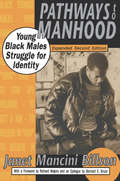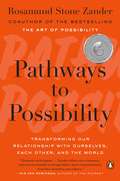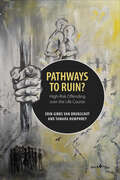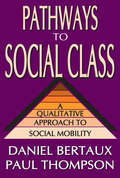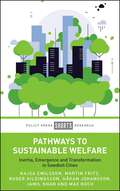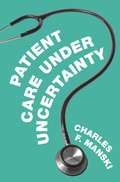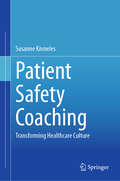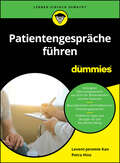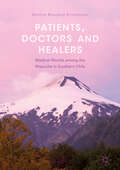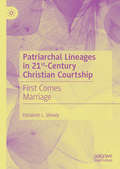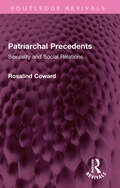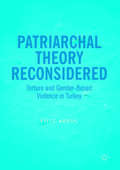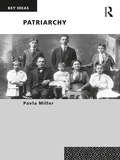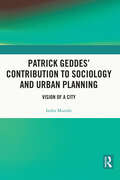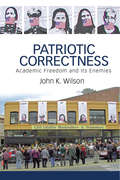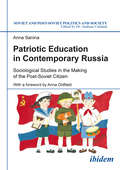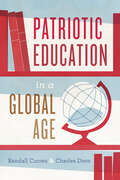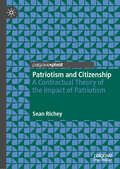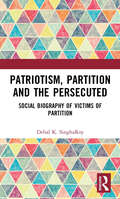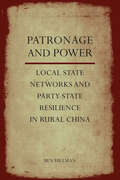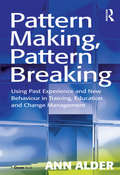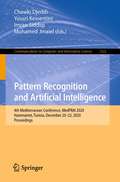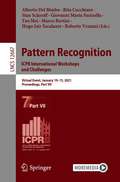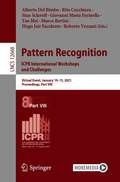- Table View
- List View
Pathways to Manhood: Young Black Males Struggle for Identity
by Janet Mancini BillsonIn Pathways to Manhood, published in cloth as Strategic Styles: Coping in the Inner City, Janet Maricini Billson studies five young boys who grew up in Roxbury, Massachusetts, during the Intense racial and political turmoil of the late 1960s and early 1970s. Using data from Harvard's Pathways to Identity project, she analyzes how healthy ego striving develops in the social and physical decay of an Inner-city environment.The author draws a rich and absorbing portrait of each boy and of his life. Although they grew up in the same social context, the boys became very different individuals. In a new preface to this expanded edition, Billson maintains that it is still vitally Important to understand the coping styles that young black males develop in the face of adversity.Bernard E. Bruce traces what happened to the five boys, who are now men In their forties, in his poignant epilogue, "From Boys to Men." A new chapter on Intervention strategies shows how parents, teachers, and others who work with inner-city youth can most effectively support positive coping styles. Graphic representations help visualize both the styles and the intervention strategies.This classic book is a valued resource for parents; for those who work in the helping professions, education, and the criminal justice system; and for students of sociological theory, social psychology, human development, and race relations.
Pathways to Possibility: Transforming Our Relationship with Ourselves, Each Other, and the World
by Rosamund Stone Zander"Rosamund Zander is a miracle. Her generous voice will resonate with you, change you and help you create work that matters." --Seth Godin, author of The Icarus Deception"Fresh, compelling, and uplifting." --Booklist The bestselling author of The Art of Possibility returns with a new vision for achieving true human fulfillmentIn this powerful and inspiring book, family systems therapist and executive coach Rosamund Stone Zander invites readers to shed the childhood stories that hold us back, and enter a realm of true maturity and fulfillment, where limitless growth becomes possible. As children, we develop stories about how the world works, most of which get improved upon and amended over time. But some do not, even as we mature in other ways. Opinionated, self-centered and fear-driven, these "child stories" are the source of the behavioral and emotional patterns that hold us back. When we learn to identify and rewrite these stories, we can do remarkable, even magical things. Zander shows us that life is a story we tell ourselves, and that we have the power to change that story. She illuminates how breaking old patterns and telling a new story can transform not just our own lives, but also our relationships with others--whether in a marriage, a classroom, or a business. Finally, she demonstrates how, with this new understanding of ourselves and our place within an interconnected world, we can take powerful action in the collective interest, and gain a sense of deep connection to the universe. This galvanizing book expands our notions of how much we can grow and change, whether we can affect others or the world at large, and how much freedom and joy we can experience. Stimulating and profound, it is the perfect companion to her beloved first book, The Art of Possibility.From the Hardcover edition.
Pathways to Ruin: High-Risk Offending over the Life Course
by Erin Gibbs Van Brunschot Tamara HumphreyIndividuals who have committed a number of crimes over their lifetimes have had complex, multi-faceted life experiences often characterized by extreme disadvantage and victimization. Those who are formally designated as "high-risk" by the Canadian criminal justice system often have a record of violent or sexual crimes. As a result, they are usually subject to additional monitoring in the community after completing a prison sentence. Pathways to Ruin disentangles the numerous elements and pathways that lead to high rates of reoffending by focusing on developmental periods of childhood, adolescence, and adulthood. The book uses a case-study approach to consider individuals’ entire crime pathway by examining the circumstances and factors that contribute to assumptions or official designations of "high-risk" behaviour. Erin Gibbs Van Brunschot and Tamara Humphrey overhaul society’s popular crime narratives and instead draw on sociological and criminological perspectives to identify historical, social, and personal contexts that appear to increase the likelihood of reoffending. They also consider how negative life experiences may be addressed to circumvent trajectories of serious offending. Reducing the social distance that the "law-abiding" public may feel towards marginalized groups, Pathways to Ruin details how legal systems could better serve these individuals, and acknowledges the many missed opportunities for compassion.
Pathways to Social Class: A Qualitative Approach to Social Mobility
by Paul Thompson Daniel BertauxCalling for a broader, new approach to social mobility research, Pathways to Social Class: A Qualitative Approach to Social Mobility moves beyond pure statistics to use qualitative techniques-such as life stories and family case studies-to examine more closely the dynamics of mobility and address more fundamental sociological questions.
Pathways to Sustainable Welfare: Inertia, Emergence and Transformation in Swedish Cities
by Håkan Johansson Max Koch Martin Fritz Kajsa Emilsson Roger Hildingsson Jamil KhanAvailable open access digitally under CC-BY-NC-ND licence. Pathways to Sustainable Welfare critically examines how cities can address the dual challenges of climate change and sustainability while ensuring the welfare of their populations. Focused on three Swedish cities, it explores the integration of environmental and welfare concerns in local policies, urban movements and public opinions. Based on theories of inertia, emergence and transformation, it identifies factors driving or obstructing sustainable welfare advancements. This book is a crucial resource for scholars interested in sustainable transformation, urban governance and social policy. It offers frameworks and empirical evidence relevant to academics, policy makers and practitioners seeking to understand and engage in urban sustainable welfare development.
Patient Care under Uncertainty
by Charles F. ManskiHow cutting-edge economics can improve decision-making methods for doctorsAlthough uncertainty is a common element of patient care, it has largely been overlooked in research on evidence-based medicine. Patient Care under Uncertainty strives to correct this glaring omission. Applying the tools of economics to medical decision making, Charles Manski shows how uncertainty influences every stage, from risk analysis to treatment, and how this can be reasonably confronted.In the language of econometrics, uncertainty refers to the inadequacy of available evidence and knowledge to yield accurate information on outcomes. In the context of health care, a common example is a choice between periodic surveillance or aggressive treatment of patients at risk for a potential disease, such as women prone to breast cancer. While these choices make use of data analysis, Manski demonstrates how statistical imprecision and identification problems often undermine clinical research and practice. Reviewing prevailing practices in contemporary medicine, he discusses the controversy regarding whether clinicians should adhere to evidence-based guidelines or exercise their own judgment. He also critiques the wishful extrapolation of research findings from randomized trials to clinical practice. Exploring ways to make more sensible judgments with available data, to credibly use evidence, and to better train clinicians, Manski helps practitioners and patients face uncertainties honestly. He concludes by examining patient care from a public health perspective and the management of uncertainty in drug approvals.Rigorously interrogating current practices in medicine, Patient Care under Uncertainty explains why predictability in the field has been limited and furnishes criteria for more cogent steps forward.
Patient Safety Coaching: Transforming Healthcare Culture
by Susanne KnowlesThis book argues that patient safety is the cornerstone of high-quality healthcare, and that we need to highlight the positive impact of a Safety-11 approach to risk management to improve the quality of patient services and care. Moreover, the author emphasizes the importance of upskilling leaders with coaching capability within the healthcare facility so that decisions can be made quickly to prevent adverse events. In light of this, this book aims to equip clinical leaders across all levels and in all areas of healthcare organizations with the knowledge and skills to develop a patient safety culture in their team and organization based on evidence-based contemporary research into patient safety practices. The author also proposes strengthening leader capability by outlining how they can create a psychologically safe working environment and adopt a coaching leadership style that promotes staff wellbeing and patient care. This book provides strategies for leaders so they can ensure staff wellbeing at work and a patient-centric approach to patient care. It outlines how clinical leaders can support team members to reduce their stress, better utilize their strengths, practice mindfulness, remain positive, and build resilience in the face of adversity, whilst also fostering a workplace culture of trust, support, and compassion. Lastly, this book aims to provide high-level executives and experienced clinical leaders with contemporary knowledge of governance issues and the best practice methods concerning patient safety as a quality improvement strategy.
Patientengespräche führen für Dummies (Für Dummies)
by Levent-Jeremie Kan Petra HinzEin unverblümt praxisnahes Handbuch für mehr Verständnis für beide Seiten Verstehen und verstanden werden – nicht selten ein Problem zwischen Behandelnden und Patient. Das kann dieses Buch ändern. Aus verschiedenen Perspektiven stellen Ihnen die Autoren die Ursachen des vielschichtigen Kommunikationsproblems differenziert sowie zielgerichtet vor. In Form von Denkanstößen, Empfehlungen und praktischen Übungen bieten Sie Ihnen auch greifbare Lösungen dazu an. Dabei erklären sie, wie Sie sie erfolgreich auf Ihre individuelle Situation übertragen. In welche Themenschwerpunkte Sie sich hineinarbeiten, welche Ziele Sie sich setzen – all das bleibt Ihnen überlassen. Sie erfahren Was Behandelnder und Patienten jeweils voneinander erwarten Wie Sie Fettnäpfchen und Konflikte vermeiden Welchen Einfluss Ihre Patientengespräche auf Ihren beruflichen Erfolg nehmen
Patients, Doctors and Healers
by Dorthe Brogård KristensenRecognizing the interplay between biomedicine and indigenous medicine among the Mapuche in Southern Chile, this book explores notions of culture and personhood through the bodily experiences and medical choices of patients. Through case studies of patients in the context of medical pluralism, Kristensen argues that medical practices are powerful social symbol indicative of overarching socio-political processes. As certain types of extreme and violent experiences–known as olvidos–lack a framework that allows them to be expressed openly, they therefore surface as symptoms of an illness, often with no apparent organic pathology. In these contexts, indigenous medicine, thanks to its sensitivity to socio-political contexts, provides a space for articulation and management of collective experiences and suffering among patients in Southern Chile.
Patriarchal Lineages in 21st-Century Christian Courtship: First Comes Marriage
by Elizabeth L. ShivelyDrawing from a study of courtship media and ethnographic work at purity retreats and home-school conventions across the Midwest, this is the first inquiry into modern Christian courtship, an alternative to dating that asks young people to avoid both romance and sex until they are ready to be married. Bridging sociological and historical studies of American Christianity with youth and girlhood studies literatures, Elizabeth Shively finds that the courtship system is designed to shore up the patriarchal nuclear family structure at the center of conservative Christianity and ensure predictability in the face of emerging adulthood: single young women work to embody ideals of “luminous femininity” and model themselves after archetypes such as the “Proverbs 31 woman,” the “stay-at-home-daughter,” and the “mission-minded girl,” and courting couples strive to “guard their hearts” against premature emotional intimacy. Nonetheless, participants report that courtship, like other relationships, inevitably carries an element of risk, and it ultimately fails to offer a substantial challenge to the to the sexist realities of youth dating culture.
Patriarchal Precedents: Sexuality and Social Relations (Routledge Revivals)
by Rosalind CowardFirst published in 1983, Patriarchal Precedents is an excavation of the term patriarchy. Rosalind Coward shoes how the debates about patriarchy and matriarchy were crucial to social theories in the nineteenth century, discussing how the resolution of these debates resulted in our present ways of (mis)understanding the family, sexual relations and sexual characteristics. Rosalind Coward argues that the violent debates around patriarchy tell a salutary tale about how the term presupposed as much as it set out to explain. She demonstrates how it was used in Marxism and psychoanalysis in ways which blocked any radical thinking about sexual relations, and how the arguments against the term patriarchy within anthropology still have to be taken seriously. She argues that in order to advance our understanding of how power is exercised in sexual relations, of the place which sexual relations have within society and the construction of sexual characteristics, a series of presuppositions about sexual relations must now be cleared away. This book will be of interest to students of gender studies, women's studies, sexuality, men' s studies, sociology and anthropology.
Patriarchal Theory Reconsidered
by Filiz AkgulThis study analyzes male-female violence in comparison to state-citizen violence. The author argues that norms and values in Turkey are a reflection of processes that accommodate oppression, the intersection of which develops the argument that 'women are to men, what the citizen is for the state, in the context of Turkey. ' Gender theory, and patriarchal theory in particular, are explored in this book to describe the logic and design of gender-based violence and its relationship with political sociology.
Patriarchy
by Pavla Miller"In this major contribution to European social history, Miller has succeeded in doing to history what Richard Wagner did to music -- weaving together powerful motifs with dramatic results. " -- Choice"[Miller's book] wrestles with issues as basic as the historical construction of the Western personality and its connections with how Western societies have organized the state, the economy, the family, and intimate everyday life. " -- MaryJo MaynesThis wide-ranging study of familial, political, and economic change in the West between the sixteenth and the nineteenth centuries is organized around the two themes of the fall of a patriarchalist social order and the reformist movement to instill self-mastery into subject populations -- and how those societal shifts transformed state school systems.
Patrick Geddes’ Contribution to Sociology and Urban Planning: Vision of A City
by Indra MunshiThis book explores Patrick Geddes’s significant contributions to urban planning and sociology. His vision of the city, rooted in the principles of social development and preservation of cultural and ecological resources, has inspired generations of urban planners, architects and social scientists engaged with contemporary urban issues. The book discusses Geddes’ early experiments with urban renewal in Edinburgh, the famous Cities and Town Planning Exhibition and his work in India for the improvement of cities and towns with minimal financial and human cost. It examines the theoretical underpinnings of his ideas in relation to issues such as better housing and health; the preservation of history and culture; the role of a citizen; university and urban renewal; and the contemporary urban ecological crisis among others. Furthermore, it looks at the question of sustainability in the context of Geddes’ vision of a more humane, social, natural, and aesthetic town and city. A comprehensive review of Patrick Geddes’s ideas, this book underlines the relevance of his work to contemporary urban concerns and issues, especially in India. It will be of interest to scholars and researchers of sociology, urban studies, city planning, urban sociology, architecture, human geography, urban geography, settlement studies, development studies and environmental sustainability.
Patriotic Correctness: Academic Freedom and Its Enemies
by John K. WilsonAfter 9/11, liberal professors and students faced an onslaught of attacks on their patriotism and academic freedom. In a lively narrative this book tells the story of attacks on academic freedom in the past five years. It highlights nationally prominent and lesser known cases, drawing upon media reports, university documents, and reports and studies seldom seen by the public. It shows how conservative attacks on higher education distort the facts in order to pursue an assault on liberal ideas. A wave of Web sites and think-tanks urge students to spy on their professors for any sign of deviation from the new PC: Patriotic Correctness. Free speech on campus is facing its greatest threat in a half century, and Patriotic Correctness: Academic Freedom and Its Enemies documents the danger to rights and looks to solutions for ensuring and promoting the free exchange of ideas requisite in any thriving democracy.
Patriotic Education in Contemporary Russia: Sociological Studies in the Making of the Post-Soviet Citizen (Soviet and Post-Soviet Politics and Society #168)
by Anna SaninaThis book outlines the complexities, contestation, and contradictions in the formal organization and contents of patriotic education in post-Soviet Russia. While the topics of patriotism and patriotic education are highly political and politicized, this study approaches them from a more sociological perspective. It is based on a variety of sources and empirical data, including the indicators and budgets of federal and regional patriotic-education programs and on field research. The book explores in depth all major agents of patriotic education in Russia, such as the government, schools, youth associations, churches, and the film/cartoon industry. It traces the development of governmental patriotic programs in recent decades, discusses how the Soviet past and political traditions influence today's system of patriotic education, and presents numerous case studies illustrating real-life processes in current patriotic education.
Patriotic Education in a Global Age (History and Philosophy of Education Series)
by Randall Curren Charles DornShould schools attempt to cultivate patriotism? If so, why? And what conception of patriotism should drive those efforts? Is patriotism essential to preserving national unity, sustaining vigorous commitment to just institutions, or motivating national service? Are the hazards of patriotism so great as to overshadow its potential benefits? Is there a genuinely virtuous form of patriotism that societies and schools should strive to cultivate? In Patriotic Education in a Global Age, philosopher Randall Curren and historian Charles Dorn address these questions as they seek to understand what role patriotism might legitimately play in schools as an aspect of civic education. They trace the aims and rationales that have guided the inculcation of patriotism in American schools over the years, the methods by which schools have sought to cultivate patriotism, and the conceptions of patriotism at work in those aims, rationales, and methods. They then examine what those conceptions mean for justice, education, and human flourishing. Though the history of attempts to cultivate patriotism in schools offers both positive and cautionary lessons, Curren and Dorn ultimately argue that a civic education organized around three components of civic virtue—intelligence, friendship, and competence—and an inclusive and enabling school community can contribute to the development of a virtuous form of patriotism that is compatible with equal citizenship, reasoned dissent, global justice, and devotion to the health of democratic institutions and the natural environment. Patriotic Education in a Global Age mounts a spirited defense of democratic institutions as it situates an understanding of patriotism in the context of nationalist, populist, and authoritarian movements in the United States and Europe, and will be of interest to anyone concerned about polarization in public life and the future of democracy.
Patriotism and Citizenship: A Contractual Theory of the Impact of Patriotism
by Sean RicheyWhat is the impact of patriotism on citizens in democracies? Despite many judging patriotism negatively, we do not know much about its effect on citizenship. Most of the work on patriotism focuses on potential negatives that may derive from patriotism, such as its relationship with bigotry. Crucial debates over whether education should promote patriotism must revolve around a cost-benefit analysis over whether this is worthy of inclusion in pedagogy. This book aims to empirically demonstrate patriotism's impact on citizenship to determine whether it should be emphasized or abridged fully. Using data from multiple novel surveys and experiments, Sean Richey shows that patriotism is highly correlated with many normatively beneficial aspects of democratic citizenship and is not associated with unthinking obedience or xenophobia as is often suggested. Patriotism correlates with greater validated voter turnout and civic engagement, fewer incorrect predictions about the economy and conspiracy theory beliefs, and greater political trust, political efficacy, and satisfaction with democracy. This research provides a fuller picture of the impact of patriotism on public opinion and political behavior than has been provided previously in political theory or political psychology. It shows the benefits of patriotism for liberal democratic societies.
Patriotism, Partition and the Persecuted: Social Biography of Victims of Partition
by Debal K. SinghaRoyThis book explores the theme of continuous wreaking of brutal persecution of a Hindu family on the one hand and the uncompromising efforts of Muslim friends and neighbours to protect this family on the other. It is set against the resultant and barbaric forces let loose after the propagation of the two nation theory, and the ultimate partition of India in 1947. Based on the soical biography of a Hindu family that stayed back in East Pakistan, it traces their journey, how they became 'other' in the country of their birth and faced persecution. This, being branded the other, led to part of the family migrating to Inida, away from their natal roots. The 1965 India-Pakistan war further brought prolonged separation and sufferings for these half-families living on both sides of the borders. Subjecting one to encounter helplessness, uncertainty and poverty in India, and the other to state sponsored apathy, coercion, arrests and physical tortures. The vicious atmosphere of violent communal aggression though did not stop their Muslim friends from protecting them. When the Muslim friend was killed by the religious fanatics in the newly liberated Bangladesh, the left behind member of the Hindu family realized that it was time to leave their motherland for India, where they died with the desire to go back to their motherland, buried along with them. Despite prolonged violence and tragic separation thereafter, numerous memories of the self-sacrificing efforts of the compatriots served as recollection in collective living in the Indian subcontinent.
Patronage and Power: Local State Networks and Party-State Resilience in Rural China
by Ben HillmanPower and Patronage examines the unwritten rules and inner workings of contemporary China's local politics and government. It exposes how these rules have helped to keep the one-Party state together during decades of tumultuous political, social, and economic change. While many observers of Chinese politics have recognized the importance of informal institutions, this book explains how informal local groups actually operate, paying special attention to the role of patronage networks in political decision-making, political competition, and official corruption. While patronage networks are often seen as a parasite on the formal institutions of state, Hillman shows that patronage politics actually help China's political system function. In a system characterized by fragmented authority, personal power relations, and bureaucratic indiscipline, patronage networks play a critical role in facilitating policy coordination and bureaucratic bargaining. They also help to regulate political competition within the state, which reduces the potential for open conflict. Understanding patronage networks is essential for understanding the resilience of the Chinese state through decades of change. Power and Patronage is filled with rich and fascinating accounts of the machinations of patronage networks and their role in the ruthless and sometimes violent competition for political power.
Patronage and Power: Local State Networks and Party-State Resilience in Rural China
by Ben HillmanPower and Patronage examines the unwritten rules and inner workings of contemporary China's local politics and government. It exposes how these rules have helped to keep the one-Party state together during decades of tumultuous political, social, and economic change. While many observers of Chinese politics have recognized the importance of informal institutions, this book explains how informal local groups actually operate, paying special attention to the role of patronage networks in political decision-making, political competition, and official corruption. While patronage networks are often seen as a parasite on the formal institutions of state, Hillman shows that patronage politics actually help China's political system function. In a system characterized by fragmented authority, personal power relations, and bureaucratic indiscipline, patronage networks play a critical role in facilitating policy coordination and bureaucratic bargaining. They also help to regulate political competition within the state, which reduces the potential for open conflict. Understanding patronage networks is essential for understanding the resilience of the Chinese state through decades of change. Power and Patronage is filled with rich and fascinating accounts of the machinations of patronage networks and their role in the ruthless and sometimes violent competition for political power.
Pattern Making, Pattern Breaking: Using Past Experience and New Behaviour in Training, Education and Change Management
by Ann AlderRapid changes in technology, the nature of organisations, non-traditional career progression, globalisation and ’virtual worlds’ mean that we need to become ever more effective learners in order to keep pace with the demands placed upon us. Our patterns of understanding, the ways in which we make sense of our work and our world, hardly become fixed before we are asked to change them and form new ones. The ability to build patterns is fundamental to our ability to learn. Ann Alder’s Pattern Making, Pattern Breaking explores the ways in which educators and facilitators can work to help students build those patterns that will be most useful to them. These may be ’technical’ patterns of language, number, sequence or process. They may be thinking patterns that support problem-solving, creativity, logical analysis or empathy. They may be patterns of behaviour that demonstrate trust, influence or integrity in relationships. Ann also illustrates how you can teach students to break patterns: to help them move on in the learning process by recognising and rejecting long-held patterns of behaviour or assumptions that are unhelpful or redundant. Formal education and training do not necessarily produce learners who are well-resourced to take advantage of opportunities that arise and to avoid some of the stresses that uncertainty, ambiguity or imposed change place upon them. So, perhaps one of the most important patterns that we can explore and understand as we move forward, in a changing world, is our own pattern of learning. Whether you are a parent, teacher, tutor, trainer, coach or manager, you need to be an effective facilitator of learning and this book is the perfect starting place.
Pattern Recognition and Artificial Intelligence: 4th Mediterranean Conference, MedPRAI 2020, Hammamet, Tunisia, December 20–22, 2020, Proceedings (Communications in Computer and Information Science #1322)
by Chawki Djeddi Imran Siddiqi Mohamed Jmaiel Yousri KessentiniThis book constitutes the refereed proceedings of the 4th Mediterranean Conference on Pattern Recognition and Artificial Intelligence, MedPRAI 2020, held in Hammamet, Tunisia, in December 2020. Due to the COVID-19 pandemic the conference was held online.The 24 revised papers presented were thoroughly reviewed and selected from 72 submissions. The papers are covering the topics of recent advancements in different areas of pattern recognition and artificial intelligence, such as statistical, structural and syntactic pattern recognition, machine learning, data mining, neural networks, computer vision, multimedia systems, information retrieval, etc.
Pattern Recognition. ICPR International Workshops and Challenges: Virtual Event, January 10-15, 2021, Proceedings, Part VII (Lecture Notes in Computer Science #12667)
by Marco Bertini Giovanni Maria Farinella Hugo Jair Escalante Alberto Del Bimbo Stan Sclaroff Rita Cucchiara Tao Mei Roberto VezzaniThis 8-volumes set constitutes the refereed of the 25th International Conference on Pattern Recognition Workshops, ICPR 2020, held virtually in Milan, Italy and rescheduled to January 10 - 11, 2021 due to Covid-19 pandemic. The 416 full papers presented in these 8 volumes were carefully reviewed and selected from about 700 submissions. The 46 workshops cover a wide range of areas including machine learning, pattern analysis, healthcare, human behavior, environment, surveillance, forensics and biometrics, robotics and egovision, cultural heritage and document analysis, retrieval, and women at ICPR2020.
Pattern Recognition. ICPR International Workshops and Challenges: Virtual Event, January 10-15, 2021, Proceedings, Part VIII (Lecture Notes in Computer Science #12668)
by Marco Bertini Giovanni Maria Farinella Hugo Jair Escalante Alberto Del Bimbo Stan Sclaroff Rita Cucchiara Tao Mei Roberto VezzaniThis 8-volumes set constitutes the refereed of the 25th International Conference on Pattern Recognition Workshops, ICPR 2020, held virtually in Milan, Italy and rescheduled to January 10 - 11, 2021 due to Covid-19 pandemic. The 416 full papers presented in these 8 volumes were carefully reviewed and selected from about 700 submissions. The 46 workshops cover a wide range of areas including machine learning, pattern analysis, healthcare, human behavior, environment, surveillance, forensics and biometrics, robotics and egovision, cultural heritage and document analysis, retrieval, and women at ICPR2020.
